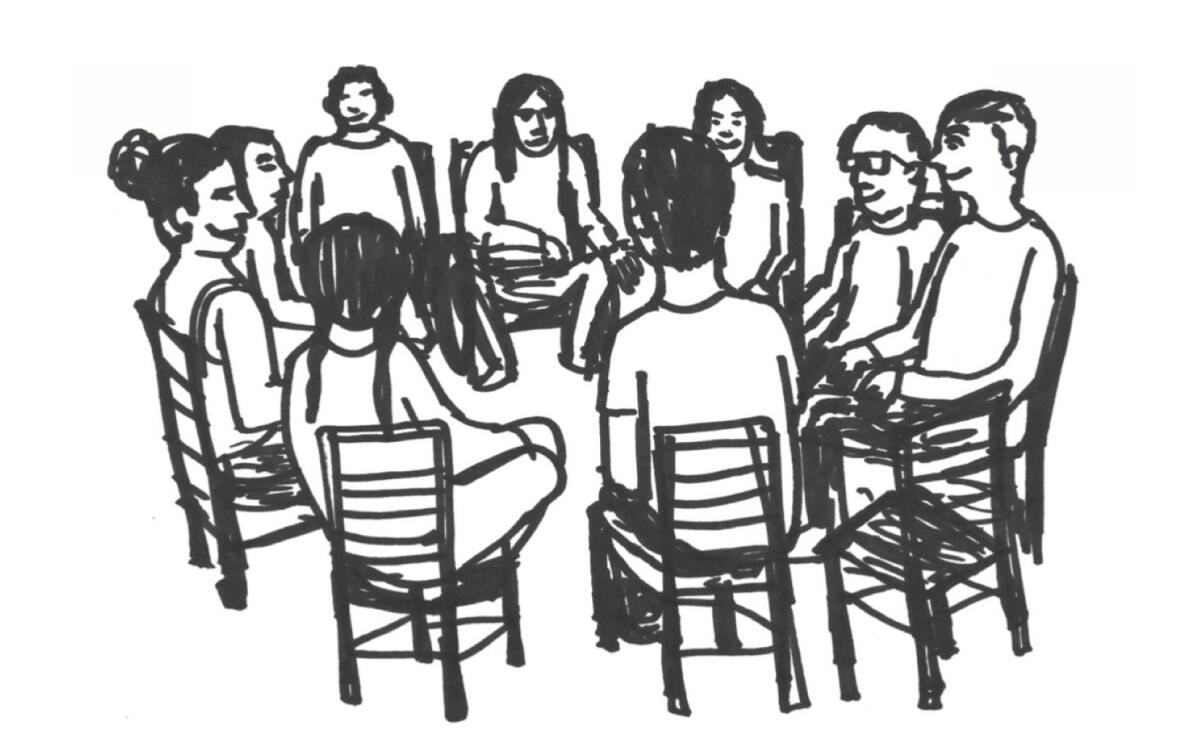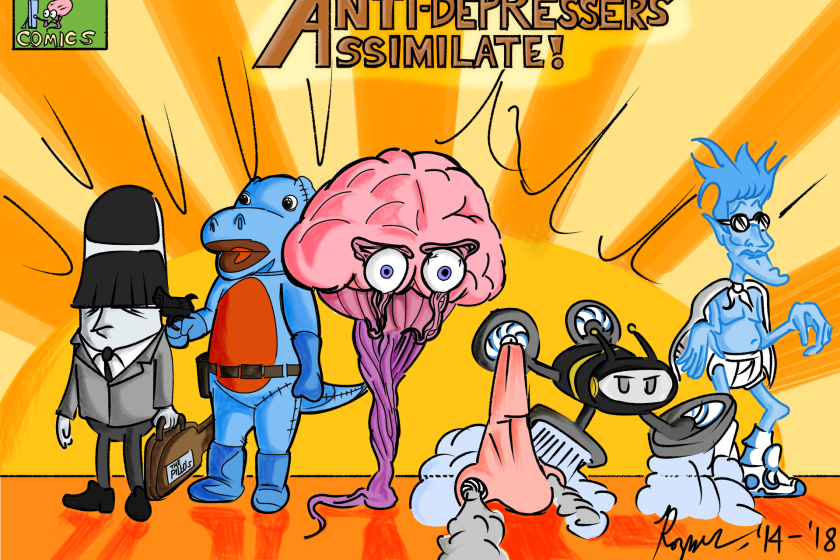Peer support can help people with mental health challenges. Here’s how it works

Painted Brain co-founders Dave Leon, Rayshell Chambers and David “Eli” Israelian use their own lived experiences with mental illness to help guide others toward recovery.
- Share via
Rayshell Chambers used to be scared to talk about her mental health challenges.
The first time she was hospitalized was at 14. She was a straight-A student and cross-country runner, but she felt isolated and nervous all the time. She didn’t know how to ask for help, so she took some pills.
“I don’t know if I would have went to a counselor and said, ‘Oh, I’m feeling sad,’ because I don’t know if they would have told my [mom],” she said. “I wasn’t ready to tell my mom that I was feeling depressed because I just wanted to seem normal.”
She said she was lucky that her mother took care of her and put her in therapy, but looking back, she thinks she would have benefited from talking to a peer, someone with lived experience with mental illness who had learned how to cope.
For the record:
10:34 a.m. Oct. 6, 2021This story incorrectly states that Rayshell Chambers has bipolar disorder. She lives with post-traumatic stress disorder.
Chambers is co-founder and chief operating officer of the peer-run mental health nonprofit Painted Brain. Now she tells everybody about her bipolar disorder and multiple hospitalizations. It’s part of her job.
”We tell people if you need somebody, to talk to us,” said Chambers. “We’ve been through it. Most of us have been hospitalized and been in board-and-cares. And now we have full-time jobs. We’re functioning. Most of us are taking our medicine or finding other ways to cope.”
The founders of the Painted Brain, a peer-support nonprofit, use their experience with managing their own mental illness to help others.
What is peer support?
“A big part of a peer supporter’s job is utilizing self-disclosure to the benefit of the people we serve,” said Guyton Colantuono, executive director of Project Return Peer Support Network, “because it can decrease the isolating factor of living with mental health [challenges], serve as an example of recovery in practice and destigmatize [issues around] mental health.”
He said typical peer support services include:
- Providing one-on-one support and facilitating self-help groups.
- Helping people develop a Wellness Recovery Action Plan (WRAP).
- Helping clients to access resources.
- Helping people get to appointments.
- Advocating for members.

“It’s the shift from a clinical support model to a social support model,” said Reham Shalaby, a psychiatry graduate student at the University of Alberta who wrote a 2020 report researching the effectiveness of peer support as a service that helps close the gaps between people with mental illness and healthcare professionals.
The idea is that peers can help patients reenter society and become more engaged in a community — and also provide a safety net to catch them before they fall.
Shalaby also helmed a study that measured how patients recently discharged from acute psychiatric care responded to the addition of peer support, as well as a supportive text messaging program, and found that it made patients more confident, hopeful and willing to seek help.
“I think it’s critical to understand that peer support services have proven to be effective in reducing recidivism in the more costly and restrictive parts of our system, like hospitals, jails and homelessness,” said Colantuono.
“This supports the clinical work,” said Chambers. “Because you have an interdisciplinary team of clinicians working hand in hand with peers to build trust, to usher peers into care.”
How peer support has evolved
Peer support has always been a critical part of recovery from mental illness, in the same way that those with experience with alcoholism find camaraderie with other AA members and breast cancer survivors support those in treatment. But it’s historically been seen as volunteer work.
Mental health resources for peers
L.A.-based peer organizations:
Painted Brain
Project Return Peer Support Network
California Association of Mental Health Peer-Run Organizations
Patients’ rights information:
Law Foundation of Silicon Valley
Disability Rights California
Psychiatric Advance Directives (PAD):
PAD FAQ from Painted Brain and USC
Disability Rights California PAD template
Free legal help:
Mental Health Advocacy Servies (MHAS)
Bet Tzedek
Family resources:
National Alliance on Mental Illness (NAMI)
Sally Zinman, executive director of the California Assn. of Mental Health Peer Run Organizations, helped launch the country’s first statewide peer-run organization in the 1970s.
“We considered ourselves a civil right movement,” she said. “We were advocating for the rights of people who had lived experience, for services that meet their needs,” she said. “Not just the medical model, but services that are more holistic and based on real-life needs. … It’s a whole different way of looking at mental health instead of just ‘You have a chemical imbalance and need a pill.’”
Last year, Gov. Gavin Newsom signed SB 803, the Peer Support Specialist Certification Program Act, which is the first step to professionalizing the work of peer support specialists.
California will be the 49th state to allow these services to be billed through Medicare and Medicaid. The state department will establish requirements for these programs — including a standardized curriculum, training, certification — by July 2022.
Suicide prevention and crisis counseling resources
If you or someone you know is struggling with suicidal thoughts, seek help from a professional and call 9-8-8. The United States’ first nationwide three-digit mental health crisis hotline 988 will connect callers with trained mental health counselors. Text “HOME” to 741741 in the U.S. and Canada to reach the Crisis Text Line.
It’s empowering for people with mental health challenges to have peer support as a potential career path, said Chambers.
It’s a profession where they can be transparent about their challenges, be around people who understand their struggles, and be proud of their ability to help people who remind them of their past selves.
“I’m happy I’m here,” said Chambers. “I can tell the little Rayshell that‘s scared, ‘Oh, you should look at what you’re doing now,’ ” she said. “ ‘You’re strong. Someone loves you. You’re appreciated. You have community. You have connection. You know where you can get help. And you know, it’s normal to feel crazy sometimes. It’s normal to feel scared.’ ”
Painted Brain co-founders Dave Leon, Rayshell Chambers and David “Eli” Israelian know what it’s like to struggle with mental illness. Through their peer-run organization, they’ve found community-based solutions to help guide those with mental health challenges toward recovery.
More to Read
Sign up for The Wild
We’ll help you find the best places to hike, bike and run, as well as the perfect silent spots for meditation and yoga.
You may occasionally receive promotional content from the Los Angeles Times.














